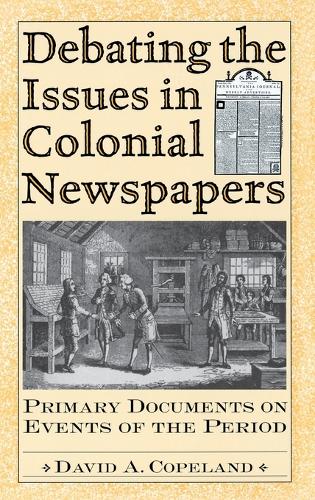
Debating the Issues in Colonial Newspapers: Primary Documents on Events of the Period
(Hardback)
Publishing Details
Debating the Issues in Colonial Newspapers: Primary Documents on Events of the Period
By (Author) David A. Copeland
Bloomsbury Publishing PLC
Greenwood Press
30th August 2000
United States
Classifications
Professional and Scholarly
Non Fiction
Media studies
Colonialism and imperialism
National liberation and independence
Social and ethical issues
973.2
Physical Properties
Hardback
416
Description
For every major event or issue of the colonial period, newspapers printed the opinions of the day, in many cases attempting to influence public opinion. Issues such as medical discoveries, education, and censorship are covered in this collection along with important events such as the French and Indian War, the trial of John Peter Zenger, and the Boston Massacre. Each chapter introduces the event or issue and includes news articles, letters, essays, even poetry representing both sides of the argument as they affected Americans. Each document is preceded by an explanatory introduction. This is the only collection of primary source documents from colonial newspapers on the events of the era and will be a valuable tool for research and classroom discussion.
Reviews
.,."provides a detailed overview of each topic....The requirement of firsthand accounts in history-curriculum standards in many states will make this volume useful for both students and teachers."-School Library Journal
...provides a detailed overview of each topic....The requirement of firsthand accounts in history-curriculum standards in many states will make this volume useful for both students and teachers.-School Library Journal
[a] worthwhile read for anyone interested in advancing his/her knowledge on the issue of freedom of the press in early North America.-Smoke & Fire News
[A]llows journalism, media studies, history, and political science students a firsthand glimpse into the issues that made Colonial America....[O]ne comes away with a clear focus on the issues that fired the Revolution....For those professors looking for a seminar text regarding the role of the press in forming Colonial American public opinion, this is a thorough, 397-page option. Yet Copeland's newspaper background comes through with a short, straightforward writing style that will hold an undergraduate's attention.-American Journalism
Debating the Issues in Colonial Newspapers is an excellent source for studying numerous topics of the colonial American period and should be considered for high-school, public, and undergraduate libraries.-Booklist/Reference Books Bulletin
For the creative high school teacher, this volume can help lead students into discussions of the earliest forms of censorship in this country, analyze the inoculation controversy over a smallpox vaccine or compare legalizing lotteries in Massachusetts. This is a little, but mighty book.-The GaleGroup
Recommended for undergraduate and general collections.-Choice
Whether students refer to this book for history or science reports, for journalism or debates, all will find in this title a unique and memorable look at what the people who forged a new country thought about the issues affecting their daily lives. Recommended.-The Book Report
"a worthwhile read for anyone interested in advancing his/her knowledge on the issue of freedom of the press in early North America."-Smoke & Fire News
"Allows journalism, media studies, history, and political science students a firsthand glimpse into the issues that made Colonial America....One comes away with a clear focus on the issues that fired the Revolution....For those professors looking for a seminar text regarding the role of the press in forming Colonial American public opinion, this is a thorough, 397-page option. Yet Copeland's newspaper background comes through with a short, straightforward writing style that will hold an undergraduate's attention."-American Journalism
..."provides a detailed overview of each topic....The requirement of firsthand accounts in history-curriculum standards in many states will make this volume useful for both students and teachers."-School Library Journal
"[a] worthwhile read for anyone interested in advancing his/her knowledge on the issue of freedom of the press in early North America."-Smoke & Fire News
"Debating the Issues in Colonial Newspapers is an excellent source for studying numerous topics of the colonial American period and should be considered for high-school, public, and undergraduate libraries."-Booklist/Reference Books Bulletin
"For the creative high school teacher, this volume can help lead students into discussions of the earliest forms of censorship in this country, analyze the inoculation controversy over a smallpox vaccine or compare legalizing lotteries in Massachusetts. This is a little, but mighty book."-The GaleGroup
"Recommended for undergraduate and general collections."-Choice
"Whether students refer to this book for history or science reports, for journalism or debates, all will find in this title a unique and memorable look at what the people who forged a new country thought about the issues affecting their daily lives. Recommended."-The Book Report
"[A]llows journalism, media studies, history, and political science students a firsthand glimpse into the issues that made Colonial America....[O]ne comes away with a clear focus on the issues that fired the Revolution....For those professors looking for a seminar text regarding the role of the press in forming Colonial American public opinion, this is a thorough, 397-page option. Yet Copeland's newspaper background comes through with a short, straightforward writing style that will hold an undergraduate's attention."-American Journalism
Author Bio
DAVID A. COPELAND is the A. J. Fletcher Professor of Communication at Elon University. A past president of the American Journalism Historians Association, he was named Carnegie Foundation for the Advancement of Teaching Virginia Professor of the Year in 1998.
